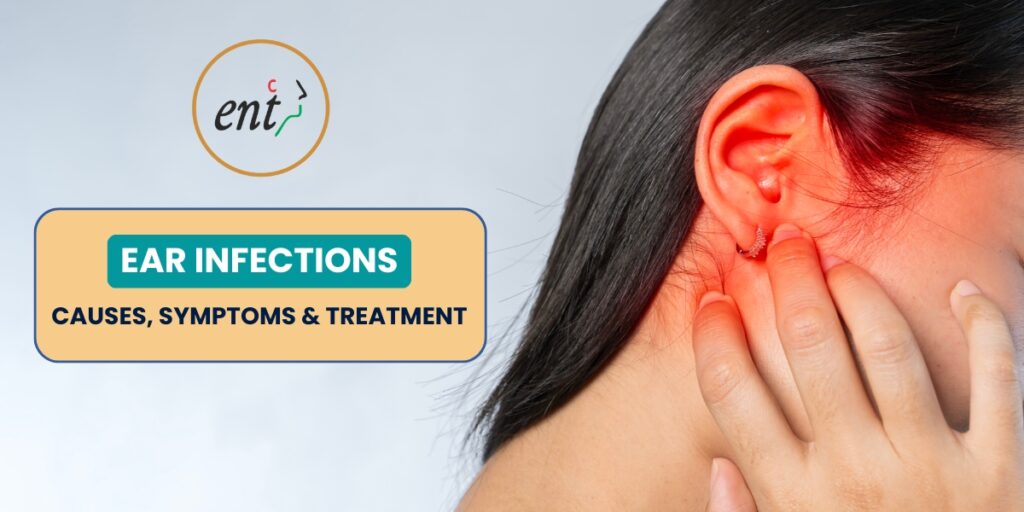Ear Infections: Causes, Symptoms, and Treatment Options

Ear infections are a common health issue that can affect people of all ages, from infants to adults. While they are often painful and uncomfortable, understanding their causes, symptoms, and treatment options can help you manage and prevent them effectively.
What Causes Ear Infections?
Ear infections, also known as otitis media, occur when the middle ear becomes inflamed due to bacterial or viral infections. Some common causes include:
Upper Respiratory Infections: Colds, flu, or sinus infections can lead to fluid buildup in the ear, creating a breeding ground for bacteria.
Allergies: Allergic reactions can cause congestion and block the Eustachian tubes, increasing the risk of infection.
Swimming or Water Exposure: Excess moisture in the ear can lead to “swimmer’s ear,” a type of outer ear infection.
Smoking or Secondhand Smoke: Exposure to smoke can irritate the Eustachian tubes and increase the likelihood of infections.
Anatomical Factors: Children are more prone to ear infections due to their smaller, more horizontal Eustachian tubes.
Symptoms of Ear Infections
The symptoms of ear infections can vary depending on the type and severity of the infection. Common signs include:
Ear Pain: A sharp, dull, or throbbing pain in the ear is the most common symptom.
Hearing Loss: Temporary hearing difficulties may occur due to fluid buildup.
Fluid Drainage: Pus or fluid may drain from the affected ear.
Fever: Especially in children, ear infections can cause a high fever.
Irritability: Infants and young children may become fussy or cry more than usual.
Dizziness or Balance Issues: The inner ear plays a key role in balance, so infections can cause dizziness.
Treatment Options for Ear Infections
The treatment for ear infections depends on the cause and severity. Here are some common approaches:
Antibiotics: If the infection is bacterial, your doctor may prescribe antibiotics to clear the infection.
Pain Relievers: Over-the-counter pain medications like ibuprofen or acetaminophen can help reduce pain and fever.
Ear Drops: Medicated ear drops may be recommended for outer ear infections.
Warm Compress: Applying a warm cloth to the affected ear can help alleviate pain.
Surgical Intervention: In chronic cases, a minor surgical procedure to insert ear tubes may be necessary to drain fluid and prevent future infections.
Preventing Ear Infections
Prevention is always better than cure. Here are some tips to reduce the risk of ear infections:
Practice good hygiene to avoid colds and flu.
Keep your ears dry, especially after swimming or bathing.
Avoid smoking and exposure to secondhand smoke.
Stay up-to-date with vaccinations, such as the flu and pneumococcal vaccines.
Address allergies promptly to prevent congestion.
When to See a Doctor
If you or your child experience severe ear pain, persistent symptoms, or hearing loss, it’s important to seek medical attention. Early diagnosis and treatment can prevent complications like hearing damage or chronic infections.
Dr. Rohit Prasad – ENT Specialist in Bhosari, Moshi
If you are in Bhosari, Moshi, or the surrounding areas and need expert care for ear infections or other ear, nose, and throat issues, Dr. Rohit Prasad is here to help. As a highly skilled ENT specialist,
Recent Post
-
Chronic Sinusitis: When Is It Time for Functional Endoscopic Sinus Surgery (FESS)?
-
Tonsillitis vs Chronic Throat Infection: Signs, Treatment & Home Care
-
What are the symptoms of throat issues?
-
Seasonal Allergies and Sinus Health: Tips for Relief
-
Common Ear Infections: Symptoms, Causes, and When to See a Doctor

